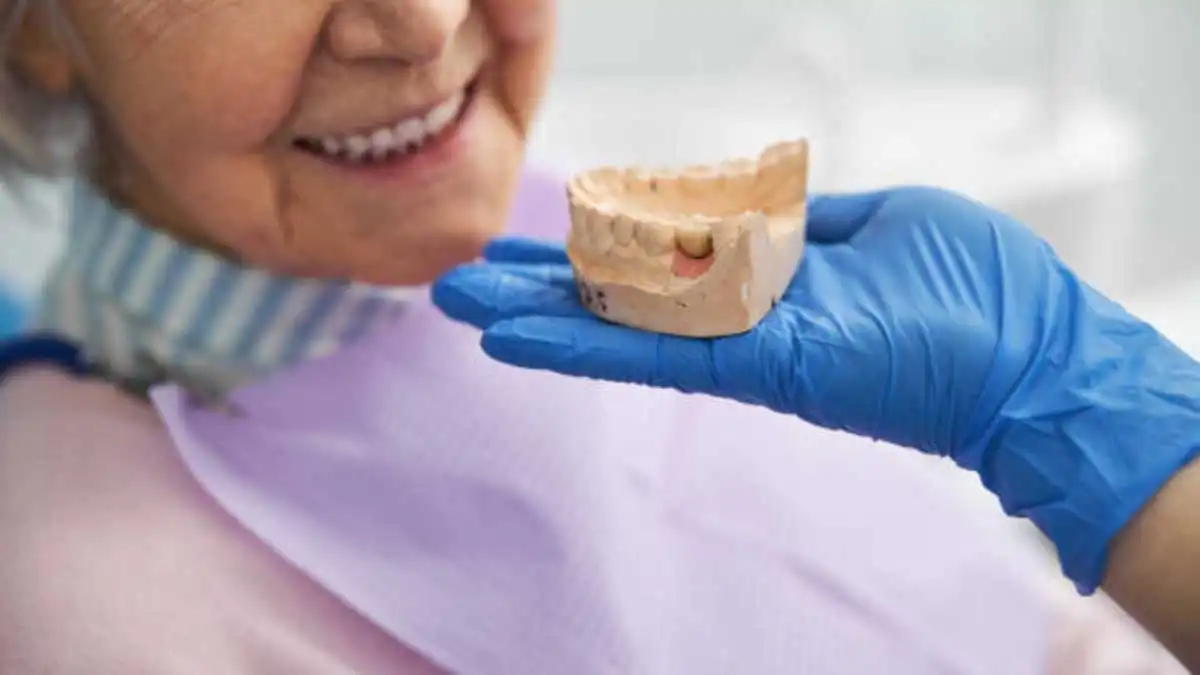HEALTH AND FITNESS
Why Dental Implants Are the Best Option for Replacing Missing Teeth in Seniors

As we age, the body undergoes many changes, and our dental health is no exception. For seniors, maintaining a healthy smile can become a challenge, especially when it comes to missing teeth. While traditional tooth replacement options such as dentures or bridges have been used for years, dental implants are now considered the gold standard for replacing missing teeth, especially for older adults. With their durability, functionality, and aesthetic benefits, dental implants provide a permanent solution that can greatly enhance a senior’s oral health and overall quality of life.
At the Center For Implant Dentistry, we specialize in providing seniors with the best possible care and treatment options for tooth replacement. In this article, we will explore the many reasons why dental implants are the best option for seniors looking to replace missing teeth, from preserving bone health to restoring confidence and improving overall well-being.
The Challenge of Tooth Loss in Seniors
Tooth loss in seniors is a common issue, with many older adults experiencing partial or complete tooth loss as they age. The causes of tooth loss in seniors can range from gum disease, tooth decay, trauma, or simply the natural aging process. Missing teeth can lead to a variety of problems, not just cosmetic but functional as well. Without proper tooth replacement, seniors can face challenges with eating, speaking, and even maintaining their facial structure.
For many seniors, traditional solutions like dentures or bridges are the go-to option. While these options can restore some level of function and appearance, they come with several drawbacks that can make them less desirable in the long term. On the other hand, dental implants offer a host of benefits that make them an ideal choice for seniors looking for a permanent, stable, and functional solution to missing teeth.
1. Preservation of Bone Health
One of the most significant benefits of dental implants, especially for seniors, is their ability to preserve jawbone health. When a tooth is lost, the jawbone beneath it can begin to deteriorate, a process known as bone resorption. This happens because the missing tooth no longer provides the necessary stimulation to the bone during chewing. Over time, this can lead to a shrinking jawbone, which not only affects the fit of dentures but can also alter the appearance of the face.
Dental implants help to prevent bone loss by providing the same stimulation to the jawbone as natural tooth roots. When the titanium implant is placed in the jaw, it fuses with the bone in a process called osseointegration. This fusion helps preserve the bone structure and prevents the facial changes that often accompany tooth loss. For seniors, this is especially important, as preserving bone health can prevent further complications and improve the long-term success of the implant.
2. Improved Functionality and Comfort
Traditional dentures are a common solution for replacing missing teeth in seniors, but they are far from perfect. Dentures can slip, slide, or even fall out while speaking or eating, causing discomfort and self-consciousness. For seniors, this lack of stability can make it difficult to enjoy meals or participate in social activities without worrying about their dentures shifting or causing irritation.
Dental implants, on the other hand, are securely anchored into the jawbone, providing a stable and permanent solution. Once in place, dental implants function like natural teeth, allowing seniors to eat, speak, and smile with confidence. There is no need for messy adhesives or worrying about the implants shifting, making them a far more comfortable and reliable option compared to dentures. Providers such as 4M Dental Implant Centers specialize in these advanced solutions, offering seniors a more dependable and natural-feeling alternative to traditional tooth replacement options.
Furthermore, because dental implants are permanent, they do not require the ongoing maintenance that dentures do. Dentures need to be cleaned and adjusted regularly, and over time, they may need to be replaced due to wear and tear. Implants, however, require only regular brushing, flossing, and professional cleanings, just like natural teeth. This simplicity makes them an ideal option for seniors looking for a low-maintenance solution to tooth replacement.
3. Improved Aesthetics and Confidence
Missing teeth can take a toll on self-esteem, especially for seniors who may already be dealing with the natural effects of aging. For many older adults, a smile is an important part of their self-image and social interactions. However, dentures, while functional, may not always provide the most natural-looking solution. Dentures can sometimes look bulky or unnatural, especially if they are poorly fitted or if the person has thin gums that reveal the underlying acrylic material.
Dental implants are custom-designed to look and feel just like natural teeth. The restoration placed on top of the implant (whether it’s a crown, bridge, or full denture) is carefully crafted to match the color, shape, and size of the patient’s natural teeth, providing a seamless, aesthetic result. Because dental implants are securely fixed in place, they also provide the confidence that comes with not worrying about slipping or discomfort. For seniors, this restored smile can boost self-esteem, improve social interactions, and enhance overall quality of life.
4. Better Oral Health and Hygiene
Maintaining good oral hygiene is essential at any age, but it becomes even more important as we grow older. Traditional dentures can make it difficult to clean the gums, which can lead to gum disease, irritation, and other oral health problems. Additionally, because dentures do not interact with the jawbone, they do not stimulate the bone or prevent it from deteriorating over time.
Dental implants, however, are just like natural teeth in terms of oral care. They can be brushed and flossed as you would your regular teeth, and because they are anchored in the jaw, they help maintain the health of the surrounding gums and bone. By preventing bone loss and providing a stable structure, dental implants contribute to better overall oral health and hygiene. This is especially important for seniors, as maintaining a healthy mouth can help prevent complications such as gum disease or tooth decay.
5. Long-Term Cost-Effectiveness
When it comes to cost, dental implants may seem like a significant investment upfront. However, when you consider the long-term benefits, implants can actually save you money in the long run. Traditional dentures need to be replaced or relined every few years due to changes in the mouth and jawbone. Over time, this can become costly and inconvenient, especially for seniors who may require adjustments frequently.
Dental implants, on the other hand, are a one-time investment that can last a lifetime with proper care. While the initial cost may be higher, the long-term savings are significant, as there are no ongoing costs for repairs, replacements, or relining. Additionally, because dental implants help preserve the health of the jawbone and surrounding teeth, they reduce the risk of additional dental issues, which could result in more expenses down the line.
6. Prevention of Additional Health Issues
For seniors, the loss of teeth can cause more than just cosmetic problems; it can lead to other health issues as well. Missing teeth can affect the ability to chew properly, which in turn can lead to digestive problems due to insufficient breakdown of food. Inadequate chewing can also cause nutritional deficiencies, as seniors may avoid certain foods that are harder to chew.
By restoring the ability to chew and bite properly, dental implants promote better nutrition and digestion. They allow seniors to eat a variety of foods, including fresh fruits, vegetables, and proteins, which are essential for maintaining good health. Implants also prevent the changes in the bite that can occur with missing teeth, which can cause issues such as jaw pain or headaches.
Conclusion
Dental implants are the best option for replacing missing teeth in seniors, offering a permanent, functional, and aesthetic solution that can significantly improve both oral health and quality of life. Unlike traditional dentures, which can be uncomfortable, unstable, and difficult to maintain, dental implants provide a secure, long-lasting, and low-maintenance alternative. They offer numerous benefits, including the preservation of jawbone health, improved comfort and functionality, enhanced aesthetics, and long-term cost-effectiveness.
At the Center For Implant Dentistry, we understand the unique needs of seniors and are committed to providing the best care possible to ensure that our patients receive the most effective and lasting solutions for their oral health. If you are a senior considering dental implants, or if you’d like to learn more about how implants can improve your smile and overall well-being, contact us today to schedule a consultation. We’re here to help you take the next step toward a healthier, more confident smile.
-

 BIOGRAPHY9 months ago
BIOGRAPHY9 months agoBehind the Scenes with Sandra Orlow: An Exclusive Interview
-

 HOME1 year ago
HOME1 year agoDiscovering Insights: A Deep Dive into the //vital-mag.net blog
-

 HOME1 year ago
HOME1 year agoSifangds in Action: Real-Life Applications and Success Stories
-

 BIOGRAPHY1 year ago
BIOGRAPHY1 year agoThe Woman Behind the Comedian: Meet Andrew Santino Wife




























